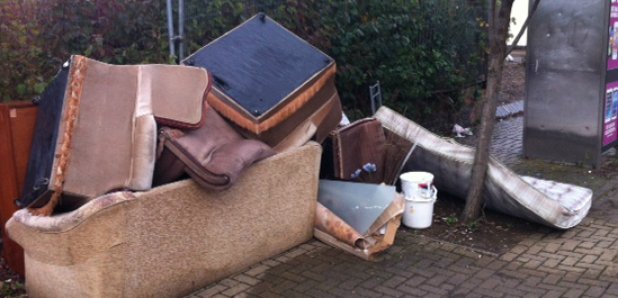Fears Bucks policy could increase fly tipping
17 July 2019, 12:02 | Updated: 17 July 2019, 12:05

After some councils - including Buckinghamshire have begun rolling out fees at waste recycling centres - environmental campaigners are warning it could lead to a rise in illegal fly-tipping.
The Government has announced a review of current rules at waste recycling centres after authorities - like Bucks County Council now charge £20 for getting rid of boilers at tips.
Keep Britain Tidy, said it was better to encourage people to safely dispose of their waste rather than risk leading them to illegally dump materials at the roadside.
READ MORE
Allison Ogden-Newton, chief executive of environmental charity Keep Britain Tidy, said it was better to encourage people to safely dispose of their waste rather than risk leading them to illegally dump materials at the roadside.
She said:
"While we know local authorities have difficult choices to make in the face of diminishing resources, we know that if you make it easy for people to do the right thing they are more likely to do so.
Helping people to legally dispose of their rubbish will reduce rather than encourage fly-tipping.
We want to see the Government use some of the £1 billion of landfill tax to subsidise recycling infrastructure.
This would ensure local authorities don't have to close or restrict the use of household waste recycling centres which, in turn, will avoid future fly-tipping costs."
A Department for Environment, Food and Rural Affairs (Defra) spokesman said:
"We have been clear that disposing of household waste, including waste from DIY home improvement projects, should be free of charge. That is why we are planning to review current rules.
Where local authorities do charge people to get rid of non-household items at household waste recycling centres, they must make sure charges are proportionate and clear to understand."
Recent figures show that fly-tipping incidents have risen almost 40% in five years, prompting councils to call for tougher sentences for people who illegally dump waste.
Analysis by the Local Government Association (LGA) in May found that nobody convicted of fly-tipping since ministers introduced new guidelines in 2014 had been given the maximum £50,000 fine or 12 months in prison by the courts.
But fly-tipping incidents increased 39.6% from 714,637 in 2012/2013 to 997,553 in 2017/2108, analysis by the LGA showed.
Councils have the power to issue fixed penalty notices for smaller instances of fly-tipping.
But town hall chiefs say that in the decade to 2020 they will have lost almost 60p out of every £1 from central government and still have to deliver legally-required services such as protecting children. This squeezes the money available for discretionary powers such as issuing fines for fly-tipping.
Funding pressures means council enforcement cannot keep up with the spiralling cases of illegal waste dumping, the LGA said.
Councils took action on 494,034 incidents in 2017/2018, up by just under 70,000 cases in five years.
Previous analysis by PA has shown that, with councils facing pressure on their budgets, the majority now charge for bulky and garden waste collections, which could encourage some people to fly-tip.





















